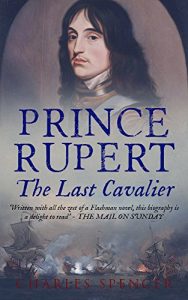Prince Rupert of the Rhine was born in Prague in 1619, heir to a life of incredible privilege. But while he was still a baby, his father, Frederick V, lost his crown in an ill-judged battle against the Habsburg Emperor. Utterly defeated, the family was given just eight hours to flee Prague, and in their hurry to escape, the infant prince was left behind. He was only saved when a courtier conducted a final sweep of the deserted palace and found him crying, alone, on the floor of one of the rooms.
Thus began a life of exile and adventure, which would see the prince at the heart of some of the most momentous events of the century.
Virtually penniless, Rupert decided at the age of twelve to become a soldier. After fighting in the Thirty Years War he eventually made his way to England, where he joined his uncle, Charles I, at the outbreak of the English Civil War. For the next four years he was the king’s most famous general, presiding over some of the war’s most spectacular victories, as well as some of its most ignominious defeats. A huge presence on the battlefield — the prince was six feet four inches tall — he was feared, hated and respected by his enemies in equal measure.
To his fellow Royalists, fighting for King Charles I, Prince Rupert of the Rhine was the archetypal 'cavalier'. Young, handsome, expert horseman, crack pistol shot, his swaggering style irritated the stuffier of the king's courtiers almost as much as the 'Roundheads' they were fighting. To the parliamentarians, above all Oliver Cromwell, he was the ultimate 'malignant', one of those Royalists who fought on even after Charles was executed in 1649.
After the king’s downfall in 1646 Rupert was banished from Britain. Still just 26 years old, he kept the Royalist cause alive as commander of the king’s handful of ships, and for a while lived the life of a pirate prince in the Caribbean. The restoration in 1660 finally brought him back to England, where he successfully led Charles I navy in the wars against the Dutch.
In Charles Spencer’s masterly account, Prince Rupert is revealed as more than just a brave general and dashing cavalier: he was also an adventurer, a scientist, an inventor and a classical scholar.
From his dramatic childhood escape through the snows of Bohemia to respected older statesman, this biography, from the bestselling author of Blenheim, paints a compelling portrait of the greatest cavalier of them all.
‘Rupert of the Rhine proves a beguiling figure in this lively and detailed biography’ - Observer
‘an enjoyable life of one of the most alluring of Cavaliers’ - Contemporary Review
‘Well worth a read’ - York Press
Charles Spencer was educated at Eton College and obtained his degree in Modern History at Magdalen College, Oxford. He is the author of five books, including the Sunday Times bestseller Blenheim: The Battle for Europe (shortlisted for History Book of the Year, National Book Awards), Killers of the King: The Men Who Dared to Execute Charles I and The Spencer Family.
Thus began a life of exile and adventure, which would see the prince at the heart of some of the most momentous events of the century.
Virtually penniless, Rupert decided at the age of twelve to become a soldier. After fighting in the Thirty Years War he eventually made his way to England, where he joined his uncle, Charles I, at the outbreak of the English Civil War. For the next four years he was the king’s most famous general, presiding over some of the war’s most spectacular victories, as well as some of its most ignominious defeats. A huge presence on the battlefield — the prince was six feet four inches tall — he was feared, hated and respected by his enemies in equal measure.
To his fellow Royalists, fighting for King Charles I, Prince Rupert of the Rhine was the archetypal 'cavalier'. Young, handsome, expert horseman, crack pistol shot, his swaggering style irritated the stuffier of the king's courtiers almost as much as the 'Roundheads' they were fighting. To the parliamentarians, above all Oliver Cromwell, he was the ultimate 'malignant', one of those Royalists who fought on even after Charles was executed in 1649.
After the king’s downfall in 1646 Rupert was banished from Britain. Still just 26 years old, he kept the Royalist cause alive as commander of the king’s handful of ships, and for a while lived the life of a pirate prince in the Caribbean. The restoration in 1660 finally brought him back to England, where he successfully led Charles I navy in the wars against the Dutch.
In Charles Spencer’s masterly account, Prince Rupert is revealed as more than just a brave general and dashing cavalier: he was also an adventurer, a scientist, an inventor and a classical scholar.
From his dramatic childhood escape through the snows of Bohemia to respected older statesman, this biography, from the bestselling author of Blenheim, paints a compelling portrait of the greatest cavalier of them all.
Praise for Charles Spencer
‘Rupert of the Rhine proves a beguiling figure in this lively and detailed biography’ - Observer
‘an enjoyable life of one of the most alluring of Cavaliers’ - Contemporary Review
‘Well worth a read’ - York Press
Charles Spencer was educated at Eton College and obtained his degree in Modern History at Magdalen College, Oxford. He is the author of five books, including the Sunday Times bestseller Blenheim: The Battle for Europe (shortlisted for History Book of the Year, National Book Awards), Killers of the King: The Men Who Dared to Execute Charles I and The Spencer Family.






